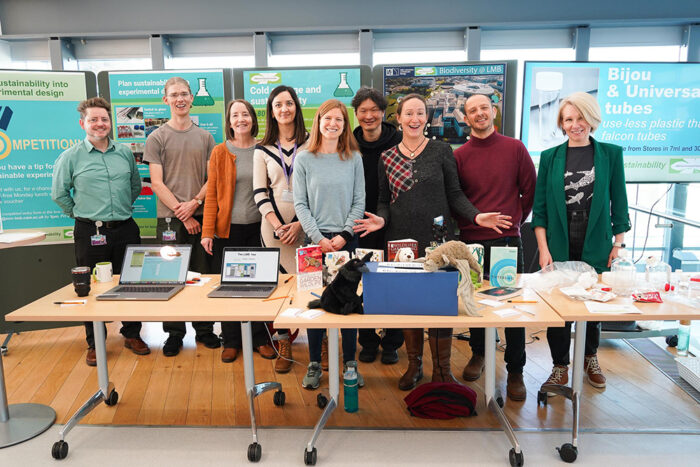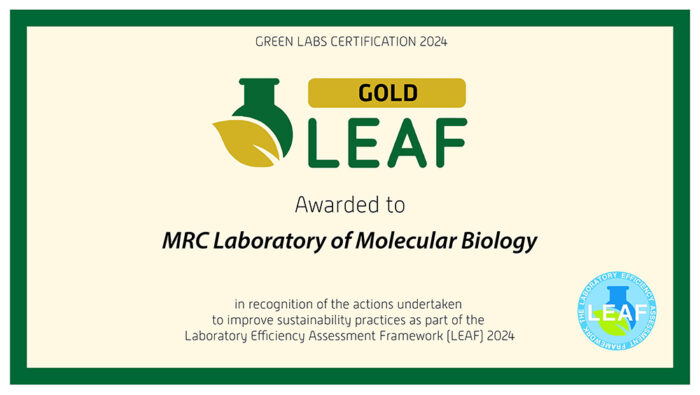
The LMB is committed to minimising the environmental impact its research has on the planet and has worked hard to implement a long list of sustainability initiatives across the institute. These efforts, spearheaded by the LMB Green Committee, have been recognised with gold accreditation in the Laboratory Efficiency and Assessment Framework (LEAF). The LEAF initiative was developed by University College London and provides a set of standards to improve the efficiency and sustainability of laboratories and technical workplaces. Recently, the Green Committee held a Sustainability Event to share details of their achievements so far and highlight further changes people can make to minimise their impact on the planet, both at work and in their daily lives.
The Sustainability Event had several stalls for people to visit, learning about a different aspect of sustainability at the LMB at each station. Those who visited at least three stalls received a small pot plant or a plant-based baked treat as a reward. The event included stalls from UKRI and Elior (the LMB’s restaurant suppliers), who each shared information about their respective sustainability work. Additionally, a lab-wide competition was held for new suggestions on how to incorporate sustainability initiatives into experiment design.
The Higher or Lower: Carbon Footprint Guessing Game was a very popular stop, where participants guessed which of two items had a larger carbon footprint. There were a wide range of items to compare, including lab equipment, everyday items, and modes of transportation. For example, players chose between a freezer running at -80°C which was periodically opened throughout the day, and an open fume hood which remained on all day (the latter has a carbon footprint almost ten times the size of the former!).

The LMB Estates Team has completed a huge amount of work to reduce the LMB’s environmental impact and were on hand to explain some of these changes. For example, in the past year the team has replaced almost 3000 lights with LED alternatives and has worked to reduce the out-of-hours air supply volume to decrease the energy spent on ventilation. The Estates Team also shared details of future works they are planning, including installing solar panels and electrifying autoclave stream-generation so that gas no longer needs to be burnt on site.
Biodiversity Sustainability Reps from the Green Committee shared details of the wide variety of wildlife found on the LMB site. This has been actively encouraged by the addition of habitat locations, including an insect hotel, a pond, nesting boxes for swifts and bats, an amphibian den, and more (all of which have been colonised naturally). It is hoped that this will continue to expand, and the Committee are planning a more extensive wildlife survey to better capture the number of species on site, as well as activities for LMB staff to get involved in.
There were plenty of resources to help people incorporate sustainability in the lab. A display of reusable lab equipment showed people the alternatives that are available for their experiments, and stickers with reminders to switch off machinery were provided. Another stall demonstrated the importance of using the correct bin. Clinical waste requires incineration and thus has a carbon footprint ten times higher than recycling and five times higher than general waste. Mistakenly using the clinical waste bin when it is not needed is therefore a costly mistake (in more ways than one, as it also costs ten times more to process clinical waste). A final stall focused on how to reduce the environmental impact of cold storage in the laboratory. The stall included a quiz on how many fridges and freezers we have at the LMB, as well as a calculator which allowed people to put the number of each fridge and freezer type they have in their lab and calculate the total cost and energy consumption of these, converting energy into number of houses or miles travelled in a petrol car.
The Sustainability Event showcased that there are several small changes everyone can make and, when done together, this truly can have a positive impact. It is excellent to see that the hard work done by the Green Committee, who voluntarily dedicate their time on top of their usual jobs, has successfully resulted in Gold LEAF status.
Further references
LMB receives silver LEAF accreditation for sustainable laboratory practices
Poppy Marriott appointed Scientific Services and Sustainability Manager
Laboratory Efficiency and Assessment Framework (LEAF)